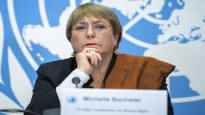If the trip to Xinjiang, the homeland of an oppressed minority, slips into a Chinese propaganda show, it would be a special blow to the credibility of the UN, writes ‘s Asian correspondent Kirsi Crowley.
BEIJING UN High Commissioner for Human Rights Michelle Bachelet’n the office confirmed on Friday that the commissioner will travel to Xinjiang, China’s disputed Uighur region, next week. For years, the negotiated trip has had a lot of criticism.
Human rights and Uighur organizations have said they have direct doubts that Bachelet will be able to see or hear evidence of the oppression of the Uighur minority in Xinjiang.
China has estimated that up to a couple of million Muslim Uighurs have been imprisoned for years in prison camps that China has called retraining centers. President Xi Jinpingin the administration is accused of, among other things, forced labor and sterilization of Uighurs.
China denies allegations of human rights abuses. According to it, Uighurs learn working life skills and Chinese customs in prisons. According to China, the camps have been closed as early as 2019 and the terrorist attacks that preceded the camps have subsided. According to researchers, forced labor and repression continue.
A propaganda visit is predicted for Bachelet’s trip, with the Chinese authorities showing the High Commissioner for Human Rights what they want. The rest would actually be a miracle, because nothing else has happened yet. But if the trip really flattened into a show, it would be a special blow to the credibility of the UN. After all, the role of the High Commissioner for Human Rights is to defend the oppressed in the world.
In fresh memory is also a visit to Wuhan by World Health Organization experts to investigate the origins of the coronavirus in February last year. The result of the trip was a succulent dispute over whether China showed the group all the necessary data. Critics asked whether China was manipulating the group to find that it was very unlikely that the virus came from a Chinese laboratory.
China has already said in advance that it will not tolerate a journey of exploration in which it will be blamed in advance. According to China, Bachelet’s visit must be friendly and cooperative. The organization of the trip has been delayed since 2018.
Michelle Bachelet will arrive in the southern Chinese city of Guangzhou on Monday and head to Xinjiang’s main cities of Kashgar and Urumqi.
When I went on a trip to Kashgar last summer, I still saw prison-like buildings, barbed wire fences, and surveillance cameras in places that were proven to be centers. There were signs in the area whose communist slogans referred to retraining.
While visiting Kashgar, I noticed that only a small number of old men arrived at the mosques, even though only years ago they were full of prayers of different ages at the time of prayer.
On his way, the UN High Commissioner for Human Rights will meet with a wide range of people, from authorities to NGOs, business representatives and researchers. According to the press release, he will also give a lecture to students at Guangzhou University. In Xinjiang, too, the intention is to speak freely as widely as possible with the various strata of the people.
But it is questionable whether China will allow interviews freely without supervision. Last summer, Kashgar had a freer atmosphere than some years earlier. The old oasis town was full of tourists and there were beautifully decorated shops and local food stalls along the street.
Our filming team was apparently not being followed, but usually when we started talking to people, they suddenly got a call and left. Those who spoke told a similar story in similar words. This could have been suspected even as a coached speech.
In recent months, foreign journalists have been virtually impossible to visit Xinjiang. Travel restrictions have been very strict, citing a coronavirus pandemic.
European diplomats, among others, have refused to visit Xinjiang unless they are allowed to move freely there to any place they want without supervision. They have also demanded to be met by a Uighur economist Ilham Tohtinwho has been a prisoner in Xinjiang for years after criticizing the Chinese regime ‘s actions against the Uighurs.
The team preparing for the visit of the High Commissioner for Human Rights has been in China for almost a month. Michelle Bachelet promises to tell the press about her visit next Saturday.
Then he will certainly also be asked when he intends to publish a report on the oppression of the Uighurs. The commissioner’s office has been gathering information for several years and the report was due to be released before the Beijing Winter Olympics, but was unexpectedly postponed.
The travel report has been loaded with big but dubious expectations. In particular, the reputation of the UN High Commissioner for Human Rights as a defender of the oppressed is at stake.
